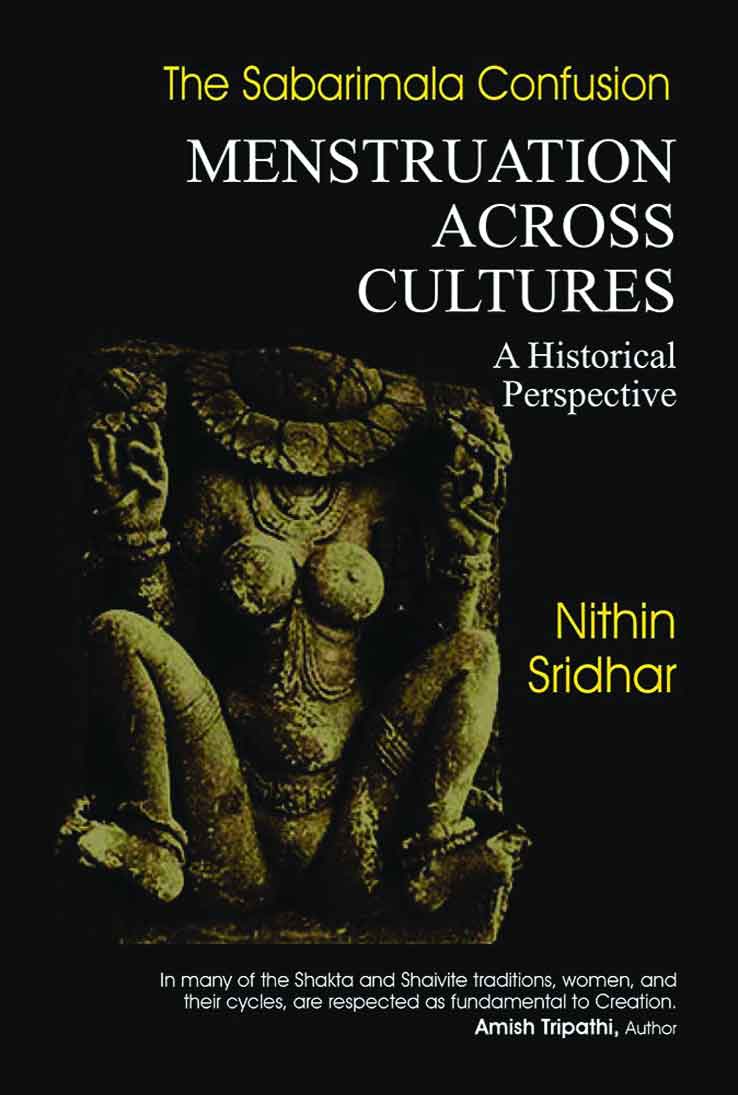The Sabarimala Confusion: Menstruation Across Cultures
Author : Nithin Sridhar,
Publisher : Vitasta, Rs 895
Through his book, Nithin Sridhar has brought out issues and concerns related to menstruation from India's cultural and historical perspectives, says Kumar Chellappan
The first time menstruation became a subject of discussion was when the issue of women worshipping at Sabarimala cropped up as part of the litigation in the Supreme Court. Women of child bearing age were not allowed to enter the holy shrine of Sabarimala, the pilgrimage centre situated in the forests of Western Ghats in Kerala. The presiding deity is Lord Ayyappa who has many manifestations. There are other Ayyappa Temples in Kerala where women could enter and worship. Since the temple in Sabarimala has the presiding deity in the form of a Brahmachari, it has been a forbidden place of worship for women in the age group of 10 to 60. It was the rationalists and atheists in the state of Kerala who came out challenging this law and approached the court for permission to visit the holy shrine. It is also interesting to note that there were no believers among the plaintiffs who had the tacit support of a major political party in the state.
Well, this much as a prelude to the book “The Sabarimala Confusion — Menstruation Across Cultures: A Historical Perspective” authored by Nithin Sridhar, who has written on topics like spirituality, religion, culture, politics, ecology and social issues. This is the first attempt of its kind to explain the social and cultural nuances associated with women cycle. Going back to my childhood, I remember my mother temporarily shifting her place of residence from our ancestral home to her sister’s house for four days during the Sabarimala season when my grand father observes the 41-day customary rituals as a prelude to his trip to the holy shrine. There was an unwritten rule that the Ayyappa devotee should not come face to face with women while the latter would be menstruating. I had never heard any rumblings or grouse that women were discriminated against because of menstruation. It was a practice which has been followed for centuries.
Sridhar has brought out issues and concerns related to menstruation from India’s cultural and historical perspectives. He has quoted from the Vedas and elaborated the menstruation notions in Abrahamic religions and ancient Western civilisations. While quoting from India’s rich cultural past, the author reiterates the stance that there would be prosperity and happiness only in places where women are accorded respect.
A girl child graduates into the big league of womanhood once she starts getting her menstrual periods. The Brahmins are known by another name, Dwijan which literally means that a he is a person who has got a second birth after coming out of mother’s womb. All are born as mere human beings in this world, but it is the karma (deeds) and dharma which makes a person a true Brahmin. Wearing the sacred thread alone does not entitle him to be a Brahmin. Same is the case with a teenaged girl who gets her periods with which she becomes a woman. The rituals associated with the girl reaching puberty is the Indian way of celebrating womanhood. In South India, especially in Tamil Nadu and Kerala, the event is celebrated with gaiety. The seclusion or the so-called separation from other family members during the four days is an act of respect bestowed on the girl, says the Vedic scriptures.
It is these references which have been distorted by the radicals, liberals and leftists who organised Menstruation Festivals all over Kerala in the aftermath of Sabarimala controversy. One of the topics which was discussed in the 2019 Literary Festival at Kozhikode was “Some thoughts on Menstruation Days”!
Sridhar has also referred to explanations given in Ayurveda about the dos and don’ts during menstruation. The four days of “forced cooling off” period and the next five to seven days are a must for all menstruating women to ensure their health and well being.
While Judaism has lot of similarities with the Indian outlook on this topic, it cannot be said that other Abrahamic religions have the same perspective. The Jews observe the restrictions during menstruation to make sure that the women’s health remains perfect so that they give birth to healthy and intelligent children.
An important observation made by Kanthapuram Abubacker Musliyaar, the Grand Mufti of India, justifying Muslim men’s rights to have four wives at a time is worth recalling. “It is to make sure that he does not go to other women during the menstrual period of his wife that a Muslim is allowed to have four wives at a time,” the Musliyaar said in a television interview. But he did not have any answer to a question posed by B M Suhara, a Muslim writer, that what would happen if all the four wives have their menstruation during the same periods. The Sabarimala issue even gave rise to a series of Menstruation Festivals across Kerala!
Though the topic of menstruation is something personal to the individuals, Sridhar has done a wonderful job by portraying it with all its seriousness. A good effort by him at a time when new wave movies are also being made on menstruation and its implications in the society!


























